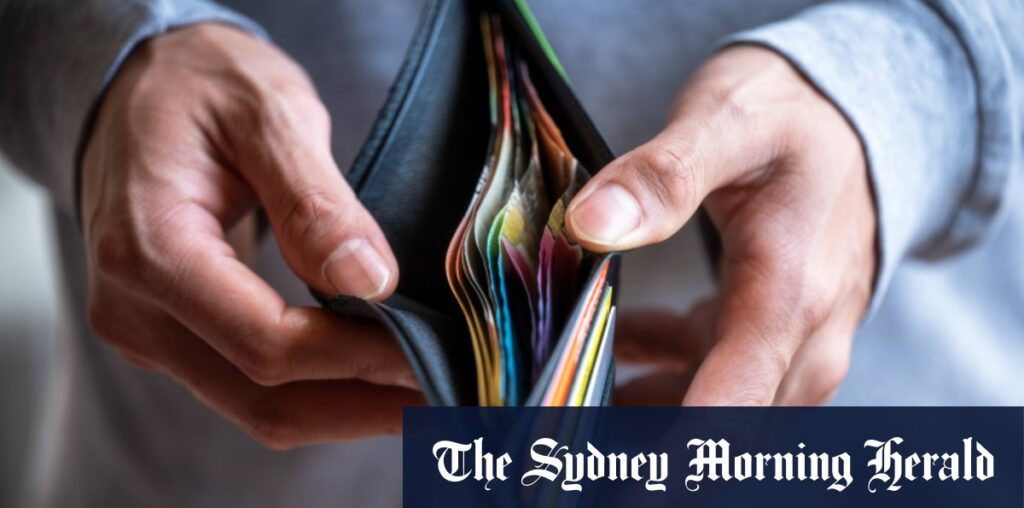While I would have spent the same amount if I hadn’t been doing the experiment, it was shocking to notice how quickly I burned through the notes.
Cash? Not so convenient
Loading
I had a few close calls using cash. When buying my racquet, I had to slightly bend the rules, using a gift card I had in my wallet, along with cash, to get over the line. This was the closest I’d been to an awkward moment at the checkout.
I found myself often doing mental arithmetic at the supermarket, calculating the cost of groceries to ensure I wouldn’t come up short at the register. I half-filled my car with petrol, expertly squeezing the trigger on the pump, so the gauge would land precisely on the dollar.
Cash also made splitting bills and shared purchases a little awkward. My brother bought a slab of beer to stock our fridge, which we’d decided to go halves on. When I offered him $27.50 in cash, he told me to get stuffed.
Luckily – and a little surprisingly – I didn’t visit any venues or shops that were cashless. Other than a few slightly taken aback bartenders and cafe staff, it was smooth sailing. The most frustrating moments of the experiment were when I’d get rebuffed at an ATM that wanted to charge me a transaction fee, which felt like defeating the point of trying to save money.
And, of course, cash can take you only so far: paying for subscriptions, bills, rent or debt repayments with an envelope of notes just doesn’t fly in 2024.
The ‘physical pain’ of cash
Dr Paul Harrison, a senior lecturer and an expert in consumer behaviour at Deakin University, says research shows using cash instead of cards can increase what experts refer to as the “pain of paying”, which can work against the joy people find in spending money.
During the week, when making smaller purchases such as buying a coffee, whipping out some coins or a small note from my wallet felt like using “free” money.
But when making larger purchases, such as the dinner bill, handing over a couple of $50 notes made me cringe. I couldn’t help but quickly break down how many hours I’d worked to earn it.
Harrison says using tap-and-go, Apple Pay or payWave – and removing the physical aspect of buying something – means we can spend money without feeling like we are. The ease of these payment methods allows us to buy things without deeply engaging in the process.
Research also indicates the speed at which we can pay electronically results in us spending more, especially on discretionary purchases.

Tap-and-go is the status quo. Credit: Shutterstock
“Psychologically, if we can get people to move through things without kind of feeling the effect of it, they’re more likely to complete that transaction,” says Harrison. “If people are using cards, they’re more likely to spend more money.”
Loading
By day four, I’d decided to try to apply this principle to my cash use. By withdrawing small amounts at a time and forcing myself to use an ATM more regularly, I could cut back on spending. After my initial $300 withdrawal, I decided to withdraw only $50 at a time for the rest of the week, to force myself to restrict my spending.
On Monday, knowing I’d have to swing by an ATM if I wanted to replenish my empty wallet, I passed on treating myself to lunch, opting instead for a DIY cheese toastie.
The secret savings
Steve Worthington, a professor in Swinburne University of Technology’s business school and cash proponent, says I would have avoided surcharges during my experiment.
“I’m sick of going into somewhere and it says, ‘OK, it’s $5 for a coffee’ and then when you pay, you realise you pay $5.05,” says Worthington. I estimate I only saved about $1 for the week, but Labor MP Jerome Laxale has estimated it costs Australians $4 billion a year.
Will I continue with cash?
The challenges in always trying to have enough cash on hand, and the attitude from my friends means I’m looking forward to going back to using phone banking and tap-and-go.
However, a renewed effort from the government shows cash is here to stay, which will be welcome news for those who still prefer or rely on it. I just hope I’m not stuck behind them fumbling with coins at the checkout.
Make the most of your health, relationships, fitness and nutrition with our Live Well newsletter. Get it in your inbox every Monday.

